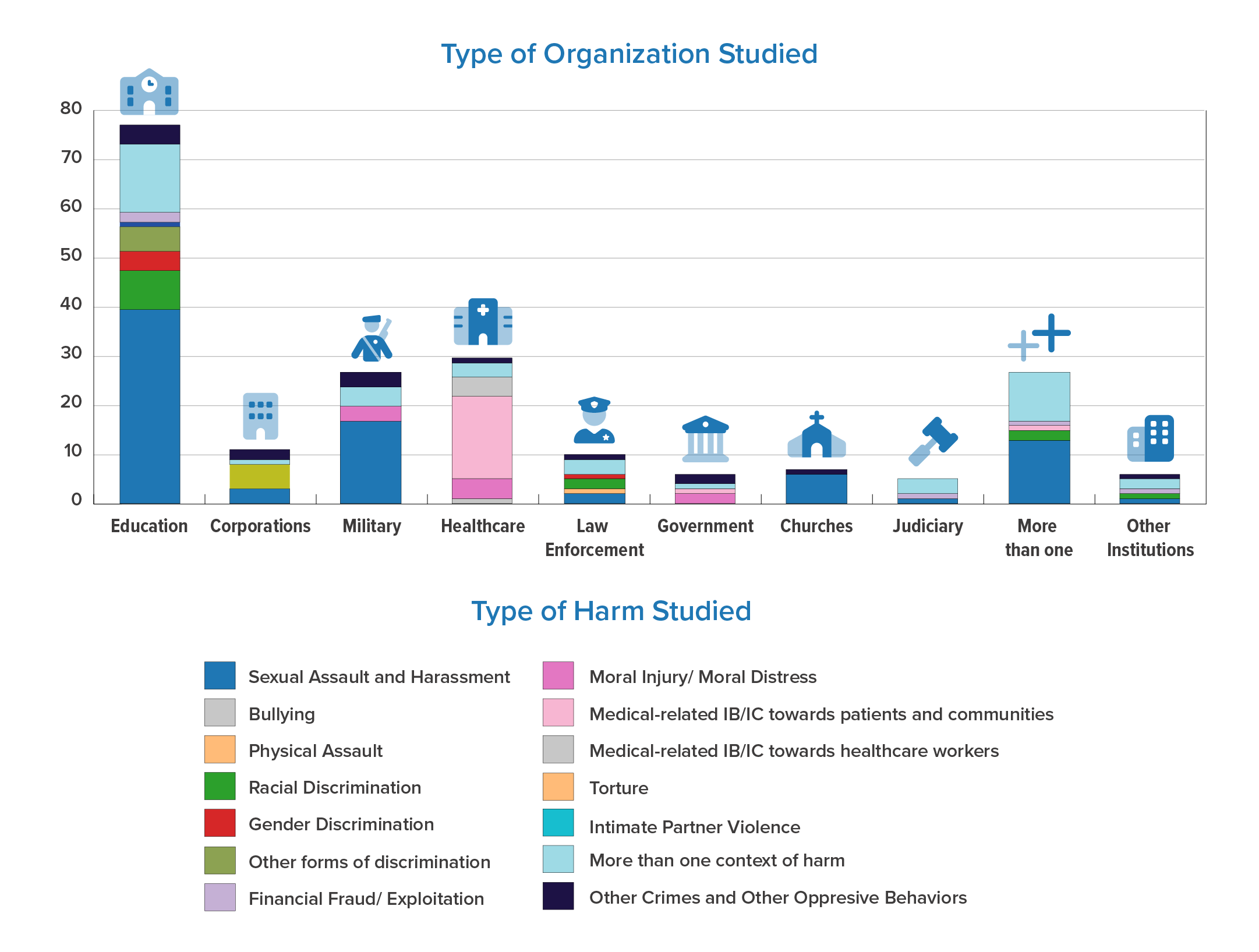April 2024
Dear Friends of Courage,
Is there research on institutional betrayal in religious organizations? What about criminal justice systems? Does moral injury have anything to do with institutional betrayal? These are among the questions that frequently come my way and one reason we established a project last year devoted to tracking research. The Spring 2024 Courage Brief begins with an article by Aubrie Patterson, Courage Research Associate, describing her fascinating discoveries while updating the publicly accessible database designed to track research on institutional betrayal and institutional courage.
What can be done about institutional betrayal in health care? This is another question I get asked quite often. The second piece in this issue is by Resa E Lewiss, MD, and it explores applying steps of institutional courage to the health care world.
Jennifer Freyd
Founder and President, Center for Institutional Courage
Institutional Betrayal and Courage: Unearthing Trends, Gaps, and Opportunities in Research
By Aubrie L. Patterson
M.S.Doctoral Student, Interdisciplinary Health PhD Program
College of Social and Behavioral Sciences
Northern Arizona University
Last October, I wrote about a publicly accessible database we developed to track research on institutional betrayal (IB) and institutional courage (IC), highlighting current trends, gaps, and opportunities for further work. Today, I’m excited to share more information about the explosion of research in this area and our efforts to track it. Our hope is that this update will empower researchers and changemakers to navigate this database effectively.
Databases Updates Due to Proliferation of Research
Over the past few months, in small bursts of time between class readings, research proposals, presentations, and lab work, I have been searching for and downloading new literature that references either IB or IC. Dr. Jennifer Freyd had asked me to update the Courage Team’s research tracking database with literature published since Fall of 2023, which is when we first launched the project. I thought, sure, that’s easy! Until I quickly unearthed over 400 pieces of new, applicable published literature (and I continue to find more and more). On the one hand, this is wonderful: clearly, consciousness is spreading about the kind of power, for better and for worse, that institutional actions and inactions can have on a person’s wellbeing and ability to recover post-trauma. On the other hand, this surge of new research meant that we had to pivot away from the detailed tracking we started out doing to keep up with our goal of updating it every 6 months.
To sustainably catalog IB/IC-related research in this rapidly growing landscape, we changed our inclusion criteria to be more stringent. Whereas before we were including papers that briefly discussed either IB or IC, the Research Tracking Database is now strictly for empirical, theoretical, or summative literature where IB or IC represent a variable, finding, or central/ recurring topic. While these are mostly peer-reviewed, there is also gray literature and other works that are published outside of a peer review process. The purpose is for researchers and other professionals to see trends in current published work, either for narrowing down study topics or for finding strong references.
Recent Trends and Research Highlights
We have noted a few interesting trends in this recent group of literature, many of which are also captured in Christl et al. (2024)’s Scoping Review of Institutional Betrayal. For instance, as someone interested in studying religious trauma, I have been surprised at the relative dearth of research on IB in religious settings, which Christl et al. also noted. Kelly’s recent study A Comparative Thematic Analysis of Institutional Betrayal in the National Women’s Soccer League and the Catholic Church (2024) was published since the review and is a novel comparison of investigative reports.
One notable overall trend is that while there is still a focus on sexual assault in educational settings, IB and IC work does seem to be spreading into other areas. In fact, work related to sexual assault in the military is now tied with that in medical-related IB towards patients and communities. Another development is that nine new empirical or theoretical articles, that we have so far cataloged, are on racial, gender-based, or other forms of discrimination in various institutional settings. This includes Gómez’s “Institutional Courage to Change the World” (2023) from her book The cultural betrayal of Black women and girls: A Black feminist approach to healing from sexual abuse. This chapter is a guide to structural and systemic transformation and a change-making process she calls “dreamstorming” that focuses on institutional support for Black women and girls. We have also noticed an uptick in moral injury-related studies. Of those we have cataloged, there are an additional 13, including Levy and Gross’s “How moral injury and combat trauma drive political activism and societal reintegration among Israeli veterans” (2023), wherein they found that political participation can increase self-esteem and empowerment in veterans. Finally, there are enough studies exclusively on intimate partner violence (IPV) to warrant giving this its own category of harm in the research database. One of these is “Betrayed by the Blue: Intimate Partner Violence and Institutional Betrayal by the Criminal Legal System” by Blewitt, Hattery, and Smith (2023), a qualitative study detailing themes related to IPV victim/survivors who have made formal reports against their abusers.
On behalf of the Courage Team, thank you to all researchers and changemakers for continuing to advance IB/IC scholarship and advocacy. It is a great pleasure to read and track this incredible work.
Join Us and Support Courage
With your help, Courage can conduct groundbreaking scientific research and share what we learn with the world. Together, we can make institutional courage a reality. Courage is a 501(c)(3) exempt organization, and your donation is deductible within the limits set by the IRS.
Institutional Courage
takes Small Steps
By Resa E Lewiss MD
The candidate for an open position at a hospital had previously worked there and was applying to come back. Everyone was talking about it. The hospital leaders spoke excitedly about his potential return and anticipated his positive contribution to the workplace culture. The trainees and staff spoke with a markedly different tone. The discussion focused on why he left and included his sexual predatory behavior at work and turmoil at home. They were concerned, and disappointed that he may be hired back.
The scenario, a fictional composite based on real accounts, is quite common. To what extent should an institution consider past behavior when contemplating rehiring someone? Supervisors may have forgotten events, may not have been in leadership roles at that time, and may not feel it’s their responsibility to police the behavior of an adult. They adopt a “that was then, this is now, let’s give him a chance” mentality. For understandable reasons, these same leaders may want to avoid discussing one person’s unprofessional and unethical behavior because that would mean holding a difficult conversation, and highlighting workplace transgressions. They also may not make a connection between their purported benefit of bringing someone skilled into a learning and patient care environment with the true cost of that same person disrupting the safety of healthcare team members with less power. Partially, leaders may lack insight into their own privilege. They may not relate to the experience of being made uncomfortable at work. It can be difficult to understand the link between the hiring of a returning employee and the institutional betrayal of that action. Employees are not likely to voice their concerns when the leadership is extolling the return of a “good guy.”
It is not unusual for these situations to go unrecognized by an institution and its leaders. People are hesitant to report illegal and unethical behaviors for reasons, such as negative consequences, retaliation, and gaslighting. When team members and trainees do not feel supported, they lose focus, act hypervigilant, and divert their energy from workplace productivity to tasks which ensure their own safety. In other words, it’s difficult to perform work optimally and prioritize patient care when you feel betrayed by your institution and its leaders.
In their article, 11 steps to promote institutional courage, Drs. Jennifer Freyd and Kathryn Blecker-Bease outline small steps, or microskills, that institutions and leaders - including hospitals and healthcare systems-- can harness and integrate toward building the larger and seemingly overwhelming goal of institutional courage. Institutions with a culture of courage are safer, more respectful, and more equitable places to work. Where there is no record due to a lack of reporting unprofessional behaviors, it is difficult for institutions to act. So institutions are responsible to realize how they can honor the whistleblowers and ensure safety when people come forward. Some actions they can take towards courage: Respond well to victim disclosures. Institutions and leaders can learn to be good listeners. And bear witness, be accountable, and apologize. Institutions and leaders can support victims in sharing their experiences. And apologize when fitting. The sequential development of these microskills and adoption of these building blocks compound to ultimately shift a culture. The time is now for leaders to support an institutional environment where the victims and a safe culture are valued over predators. Afterall, people accomplish their best work when they feel team psychological safety.
Resa E Lewiss MD is a professor of emergency medicine at the University of Alabama at Birmingham, TEDMED speaker, TimesUp Healthcare founder, and award winning educator, mentor, and point-of-care ultrasound specialist. She hosts the Visible Voices Podcast, amplifying content in the healthcare, equity, and current trends spaces. With co-author Adaira Landry, her book, MicroSkills: Small Actions, Big Impact, (HarperCollins) is forthcoming in April 2024.
Courage Team Links,
News, and Events
Articles, Links, and News from the Courage Team
Changing the Culture of Institutional Betrayal (World Health Organization)
Jennifer J. Freyd
Moving from Institutional Betrayal to Institutional Courage (NOAA)
Jennifer J. Freyd
But is it okay? The need to still ask Black/African American mothers about violence exposure during the COVID-19 worldwide pandemic
Global Journal of Community Psychology Practice
Jennifer M. Gómez
A narrative of silencing: Exploring sexual violence against women at the intersections of power and culture
The Palgrave Handbook of Power, Gender, and Psychology
Jennifer M. Gómez
Public Health Accountability in Action: The King County Pandemic and Racism Community Advisory Group
Public Health Reports
Kirsten Wysen




